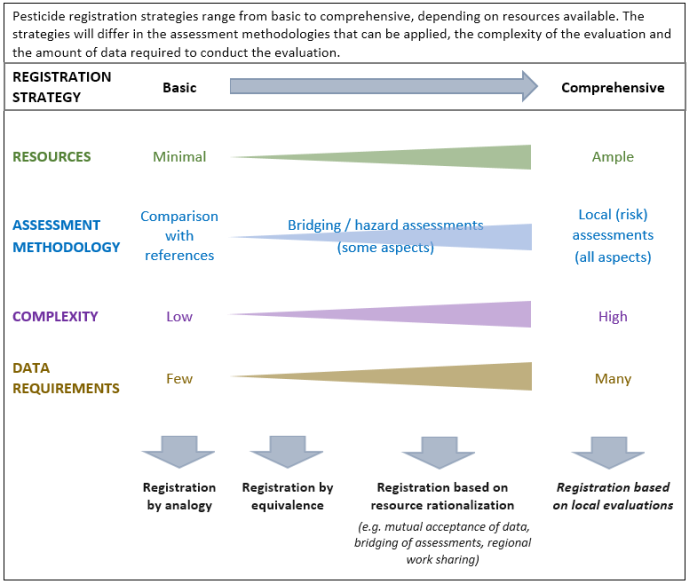Pesticide registration strategies
- Registration by Analogy
- Registration by Equivalence
- Registration based on Resource Rationalization
- Registration based on Local Evaluation
Introduction
Pesticide registration is the process whereby the responsible national government or regional authority approves the sale and use of a pesticide following the evaluation of comprehensive scientific data demonstrating that the product is effective for its intended purposes and does not pose an unacceptable risk to human or animal health or to the environment.
The pesticide registration strategy is the overall approach that a registration authority applies to evaluate and authorize pesticides. The registration strategy chosen will depend, among others, on national legislation and policy, the human resources that are available in the country for pesticide registration (e.g. technical expertise, experience) and the financial resources (e.g. number of staff, level of operational funding). A pesticide registration strategy can range from basic to comprehensive (see chart below). A basic strategy is less complex and uses fewer data, and therefore requires minimal resources. With increasingly comprehensive strategies, more data are generally used for the evaluation of the pesticide, which in turn becomes more complex but also more locally-specific. This requires additional resources at the registration authority.

Four approaches to pesticide registration are discussed in this module. The blocks below link to more in-depth information on each of the approaches.
Registration by analogy
Basic strategy when resources for registration are very limited – Based on a comparison of the submitted product with a registration in a reference country.
Registration by equivalence
Strategy requiring intermediate resources – Based on the determination of the similarity between the submitted product and a very similar registered product.
Registration based on resource rationalization
Strategy requiring intermediate/ample resources – Based on optimal use of existing data and assessments collected/conducted elsewhere.
Registration based on local evaluation
Strategy requiring ample resources – Based on use of (mainly) local data and locally specific assessments.
Phased development of a pesticide registration scheme
FAO recommends that registration authorities work towards increasingly comprehensive evaluation of a pesticide. Depending on the resources available, a country can choose the degree of complexity of the registration procedures that suits it best. Countries with limited resources may initially choose a basic registration approach requiring less staff or funding. As experience is gained over time with the evaluation of pesticide registration dossiers, expertise and infrastructure will be built up and the registration system can progressively be strengthened and tailored to the specific conditions of use in the country.

Regional collaboration for pesticide registration
Another way of optimizing limited national resources is to foster Regional collaboration for pesticide registration. Such collaboration between countries can take many forms, ranging the mutual acceptance of data (e.g. for efficacy or residue trials), work sharing (e.g. for the scientific evaluation of newly to be registered pesticides), harmonization of data requirements and evaluation methods, to a joint regional pesticide registration scheme. Regional collaboration is strongly encouraged by FAO as an effective means of improving pesticide registration in resource-limited countries/regions.
